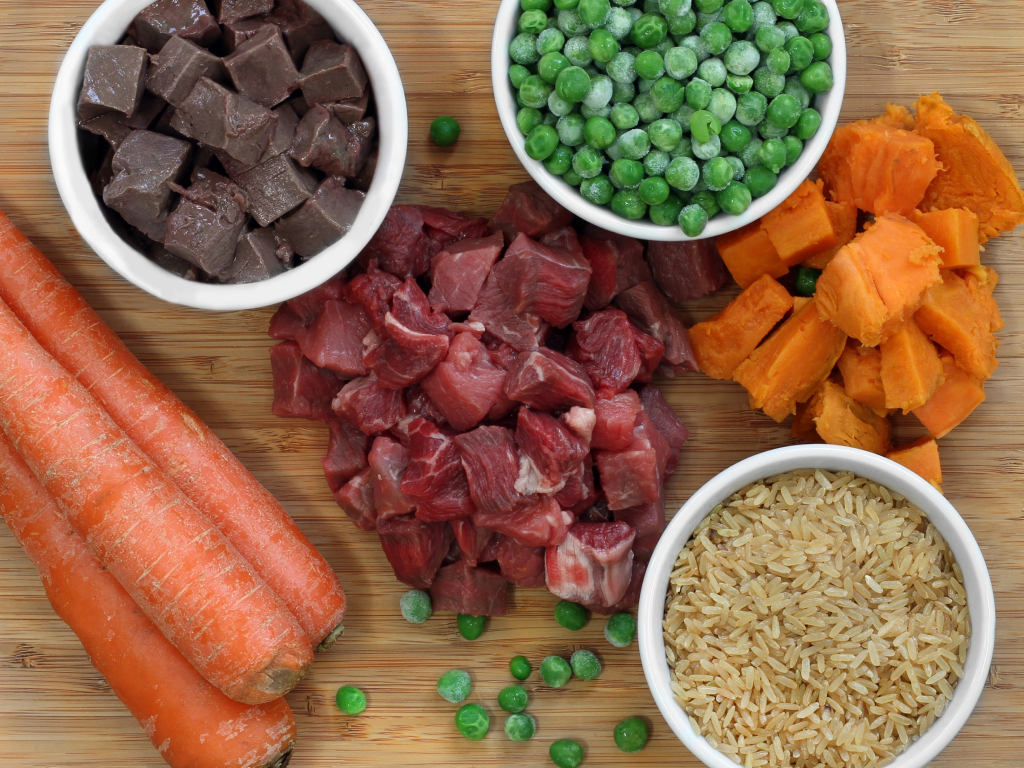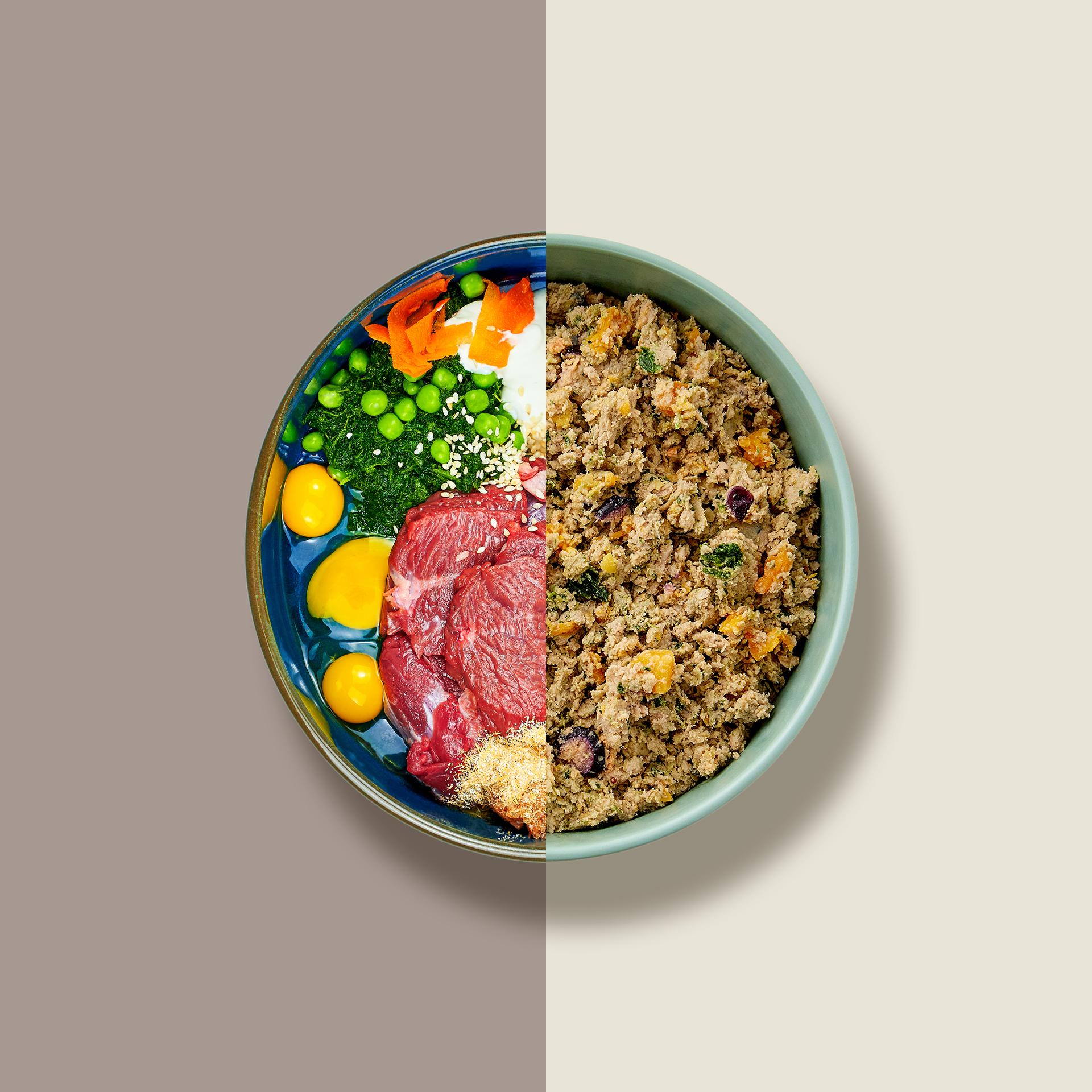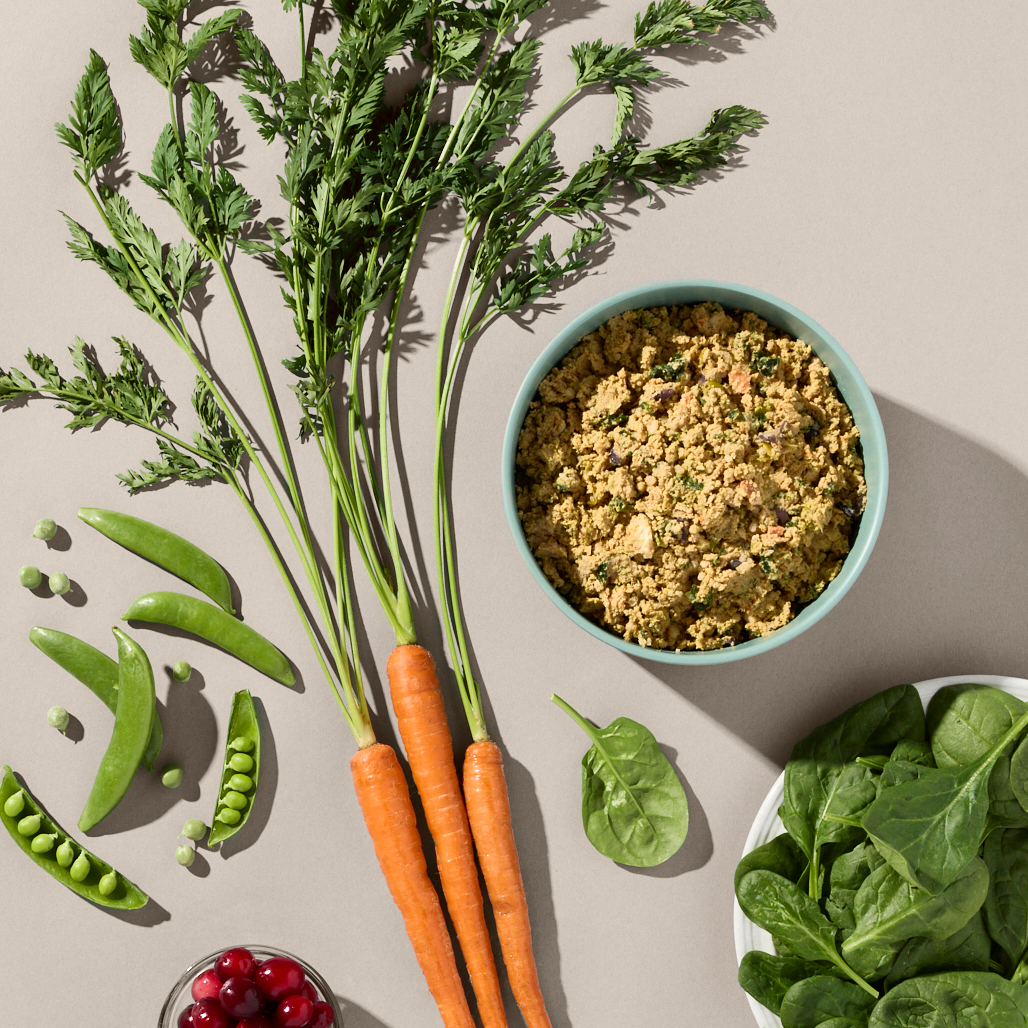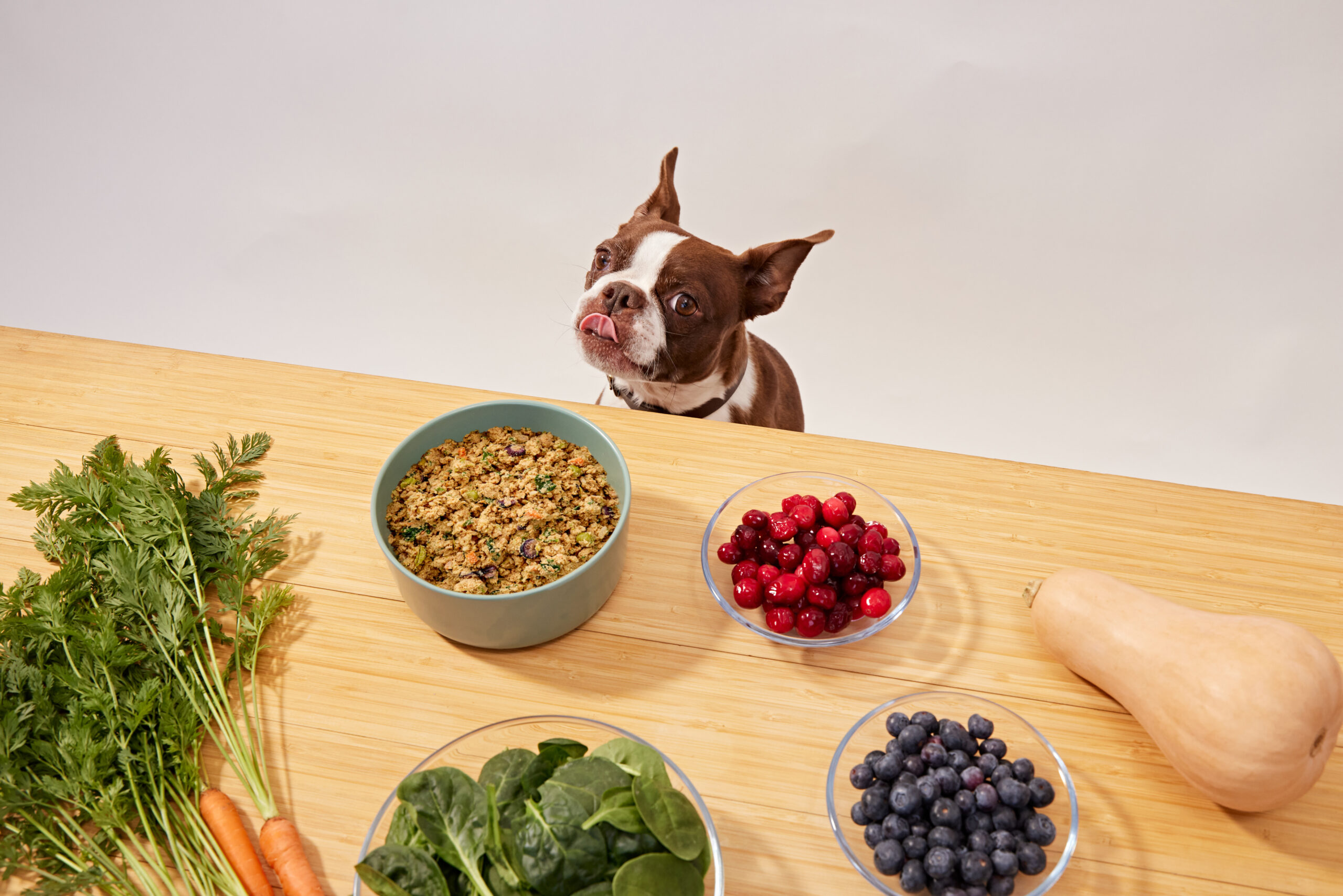Hey Ollie blog readers! We’re offering you an exclusive 60% OFF your starter box! Try now!
Feeding your dog the right food can make a world of difference. When deciding what should go into their dog’s bowl, some pup parents consider home cooking as a way to control every ingredient and have the satisfaction of preparing meals with love. However, home‐cooked diets for dogs present significant risks—especially when it comes to safety and nutrition. According to a study by the University of California, Davis, 95 percent of homemade dog food recipes analyzed were deficient in at least one essential nutrient, putting dogs at risk for long‐term health issues [1] [2]. For pup parents who want to provide the best food for their dog (especially puppies, dogs with allergies, or pups with sensitive stomachs) understanding these risks is crucial.
The Complexity of Canine Nutrition
Why Balanced Nutrition Matters
Dogs require a precise balance of 42 essential nutrients at every meal. These include proteins, fats, carbohydrates, vitamins, and minerals, all in specific ratios determined by veterinary nutritionists and regulatory agencies. Even a well‐intentioned home‐cooked meal can fall short, leading to deficiencies or excesses that may not show symptoms for weeks, months, or even years [1] [2].
Key risks of unbalanced home‐cooked diets:
- Micronutrient deficiencies: Common gaps include calcium, zinc, iron, choline, vitamins D and E, and taurine. These can cause musculoskeletal issues, heart disease, and liver dysfunction [1] [2].
- Caloric miscalculations: Without precise measurement, dogs may be underfed or overfed, leading to weight problems and related health concerns [3] [2].
- Inconsistent nutrient content: The nutritional value of meats, vegetables, and grains can vary widely based on source, season, and preparation method, making it difficult to guarantee a balanced meal every time [4] [2].
Example: A pet parent prepares chicken and rice for their dog, believing it’s a safe, gentle meal. However, without added calcium and essential vitamins, this diet can quickly lead to bone and organ problems.
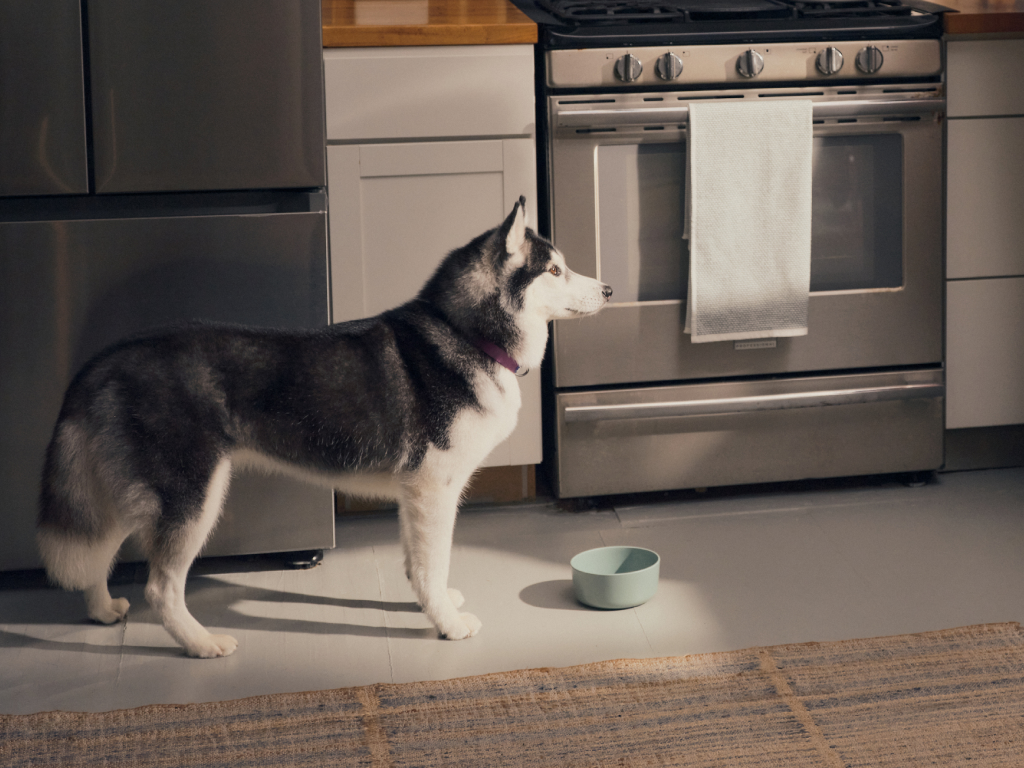
Safety Hazards in Home Cooking
Hidden Dangers in Everyday Ingredients
Many foods that are safe for humans are toxic to dogs. Even small amounts of garlic, onions, grapes, raisins, macadamia nuts, or xylitol (a common sugar substitute) can be deadly [5]. Raw or undercooked meats, fruits, and vegetables also carry the risk of bacterial contamination, such as Salmonella, which can harm both dogs and their families [5].
Common safety pitfalls:
- Toxic ingredients: Accidentally including harmful foods can have immediate and severe consequences.
- Improper food handling: Cross‐contamination and inadequate cooking can introduce dangerous bacteria.
- Ingredient sourcing: Without strict quality controls, ingredients may be contaminated or nutritionally inconsistent [2].
Caution: Even a small change in a recipe or a single ingredient swap can disrupt the nutritional balance and safety of a home‐cooked meal.
The Challenge of Supplementation
Why Supplements Are Not Optional
To meet a dog’s nutritional needs, home‐cooked diets almost always require supplementation. The type and amount of supplements depend on the specific ingredients, preparation methods, and the dog’s age, size, and health status. Only a board‐certified veterinary nutritionist can accurately determine the right supplementation for a homemade diet [4] [2].
Supplementation challenges:
- Complex calculations: Nutrient needs vary by life stage, breed, and health condition.
- Risk of over‐ or under‐supplementation: Too much or too little of a nutrient can be harmful.
- Ongoing adjustments: As your dog grows or their health changes, recipes and supplements must be updated.
Industry framework: The National Research Council (NRC) and the Association of American Feed Control Officials (AAFCO) set the standards for complete and balanced dog nutrition. Meeting these standards at home is a complex, ongoing process.
Professional Guidance: The Gold Standard
What Do Veterinarians Recommend?
Most veterinarians advise against home cooking for dogs unless it is done under the guidance of a veterinary nutritionist. Even with a carefully designed recipe, small deviations in preparation or ingredient quality can lead to nutritional imbalances [4] [2]. For puppies, pregnant, or lactating dogs, the risks are even higher, as their nutritional needs are more demanding and specific.
When home cooking is considered:
- Work with a veterinary nutritionist: They will tailor a recipe to your dog’s unique needs and monitor their health over time.
- Regular testing: Bloodwork and health checks are needed to catch deficiencies or excesses early.
- Strict adherence: Recipes must be followed exactly, with no substitutions or improvisations.
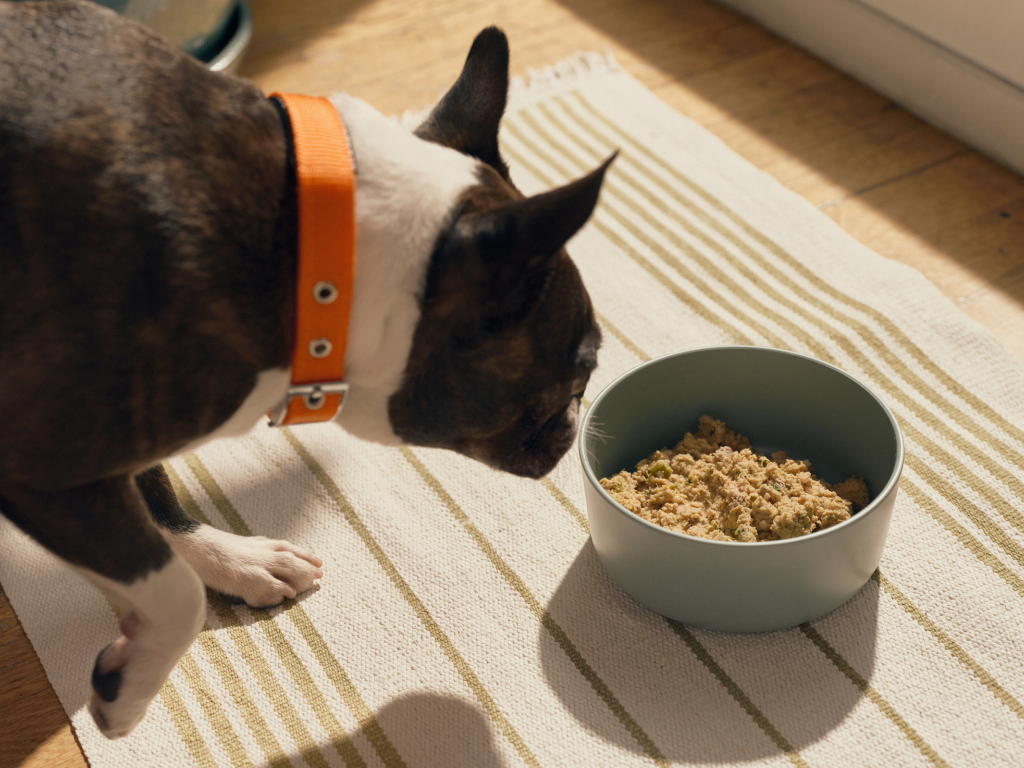
Potential for Increased Lifespan and Disease Prevention
Long-Term Health Outcomes
Feeding your dog a fresh diet can have lasting effects. Research suggests that dogs fed fresh food can live up to 2.5 years longer than those on commercial diets [3]. Diets rich in antioxidants and high-quality proteins help prevent various medical conditions, including certain cancers and chronic diseases [3].
Disease Prevention Highlights:
- Antioxidant-rich ingredients support cellular health [3].
- Fresh vegetables in the diet are linked to lower rates of some cancers [3].
- Maintaining a healthy weight reduces the risk of diabetes, arthritis, and heart disease.
Example: A study found that Scottish terriers who ate vegetables at least three times a week had lower rates of urinary bladder carcinoma [3].

Comparing Home Cooking and Fresh Dog Food Delivery
Objective Comparison Table
| Criteria | Home Cooking for Dogs | Ollie Fresh Dog Food |
| Nutritional Balance | Highly variable, often incomplete [1] [2] | Formulated with veterinary nutritionists, meets AAFCO standards |
| Ingredient Quality | Depends on sourcing, variable | Carefully sourced, quality-controlled |
| Safety | Risk of contamination, toxic ingredients | Rigorously tested, safe handling |
| Convenience | Time‐consuming, labor‐intensive | Delivered pre‐portioned, ready to serve |
| Cost | High (ingredients, supplements, time) | Transparent pricing, cost‐effective plans |
| Expert Support | Requires outside consultation | Ongoing support from Canine Support Center |
Ollie: Expert‐Led Nutrition Without the Guesswork
Ollie delivers the benefits of home‐cooked meals—fresh, whole ingredients, and tailored nutrition—without the risks and complexity. Every recipe is designed by a veterinary nutritionist to meet or exceed AAFCO standards, ensuring your dog receives complete and balanced nutrition at every meal. Ingredients are carefully sourced and inspected for quality and safety, and each meal is pre‐portioned to your dog’s specific needs.Ollie: Expert‐Led Nutrition Without the Guesswork
Why pet parents choose Ollie:
- Personalized meal plans: Recipes tailored to your dog’s age, size, and health.
- Human‐grade ingredients: Whole meats, fruits, vegetables, and grains.
- No need for supplements: Every meal is nutritionally complete.
- Convenience: Flexible delivery options and easy‐to‐serve packaging.
- Expert support: Access to Health Screenings for guidance and questions.
Frequently Asked Questions (FAQs)
Is home‐cooked dog food healthier than commercial dog food? Not necessarily. Most homemade recipes lack essential nutrients unless formulated with a veterinary nutritionist. Commercial options like Ollie are designed to be complete and balanced, meeting all your dog’s needs [1] [2].
What are the most common nutritional deficiencies in home‐cooked dog food? Calcium, zinc, iron, choline, vitamins D and E, and taurine are frequently missing or insufficient in homemade diets [1] [2].
Can I use supplements to balance my dog’s home‐cooked meals? Supplements are required, but the type and amount must be determined by a veterinary nutritionist to avoid harmful imbalances [4] [2].
Are there risks to feeding puppies a home‐cooked diet? Yes. Puppies have specific nutritional needs for growth and development. Inadequate nutrition can cause lifelong health problems [1] [2].
How does Ollie compare to home cooking in terms of cost and convenience? Ollie offers transparent pricing, flexible plans, and eliminates the need for shopping, meal prep, and supplementation. This saves time and often reduces overall costs compared to home cooking.
Take the Next Step for Your Dog’s Health
For pet parents who want the best for their pups—whether you’re searching for the best food for new puppies, healthy food for sensitive stomachs, or a reliable fresh dog food delivery—Ollie provides a safe, convenient, and expertly formulated solution. Discover how Ollie can support your dog’s health and happiness.
Citations
[1] https://www.ucdavis.edu/news/homemade-dog-food-recipes-can-be-risky-business-study-finds
[2] https://www.whole-dog-journal.com/food/concerns-about-homemade-dog-food-recipes/
[3] https://www.akc.org/expert-advice/nutrition/cooking-for-your-dog-dos-and-donts/
[5] https://www.petmd.com/dog/nutrition/how-make-sure-your-homemade-dog-food-delivers-right-nutrients
Tagged As:

The nutrition your dog needs,
the food they want.

Enjoying our articles? Subscribe our Newsletters and get new articles directly to your inbox
You might also like
12 August 2025
5 MINS READ
Raw vs. Gently Cooked: Which Is Ideal for Your Pup?
As more pup parents seek the best fresh dog food for their companions, they may find themselves choosing between a raw diet and a fresh diet. While cases have been made for both options, let’s exa…
by Ollie Pets
12 August 2025
5 MINS READ
Why Human-Grade Ingredients Matter for Your Dog
A healthier, happier dog starts with the right food. That said, knowing which diet is best for your pup can be overwhelming at times. Understanding what human-grade means, why it matters, and how …
by Ollie Pets
12 August 2025
7 MINS READ
Spotlighting the Top Nutrients for Your Dog
Just like humans, your dog’s health depends heavily on the food they consume daily. Read on to learn more about essential nutrients for your dog’s health and explore how fresh, human-grade dog foo…
by Ollie Pets
